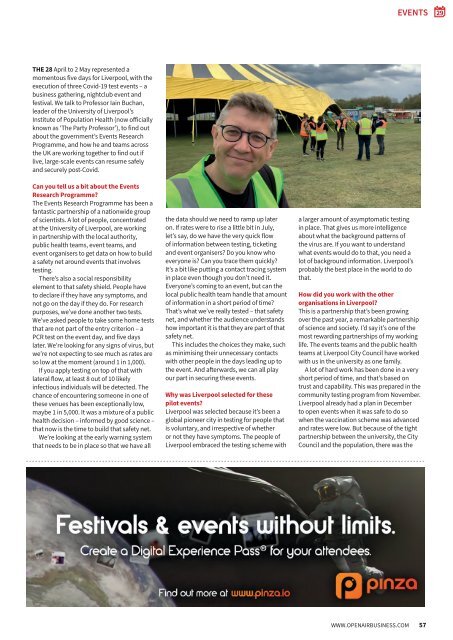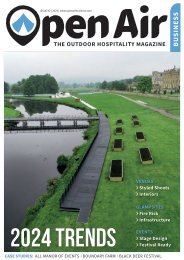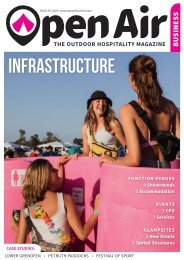May/June 2021
The UK's outdoor hospitality business magazine for function venues, glamping, festivals and outdoor events
The UK's outdoor hospitality business magazine for function venues, glamping, festivals and outdoor events
Create successful ePaper yourself
Turn your PDF publications into a flip-book with our unique Google optimized e-Paper software.
EVENTS<br />
THE 28 April to 2 <strong>May</strong> represented a<br />
momentous five days for Liverpool, with the<br />
execution of three Covid-19 test events – a<br />
business gathering, nightclub event and<br />
festival. We talk to Professor Iain Buchan,<br />
leader of the University of Liverpool’s<br />
Institute of Population Health (now officially<br />
known as ‘The Party Professor’), to find out<br />
about the government’s Events Research<br />
Programme, and how he and teams across<br />
the UK are working together to find out if<br />
live, large-scale events can resume safely<br />
and securely post-Covid.<br />
Can you tell us a bit about the Events<br />
Research Programme?<br />
The Events Research Programme has been a<br />
fantastic partnership of a nationwide group<br />
of scientists. A lot of people, concentrated<br />
at the University of Liverpool, are working<br />
in partnership with the local authority,<br />
public health teams, event teams, and<br />
event organisers to get data on how to build<br />
a safety net around events that involves<br />
testing.<br />
There’s also a social responsibility<br />
element to that safety shield. People have<br />
to declare if they have any symptoms, and<br />
not go on the day if they do. For research<br />
purposes, we’ve done another two tests.<br />
We’ve asked people to take some home tests<br />
that are not part of the entry criterion – a<br />
PCR test on the event day, and five days<br />
later. We’re looking for any signs of virus, but<br />
we’re not expecting to see much as rates are<br />
so low at the moment (around 1 in 1,000).<br />
If you apply testing on top of that with<br />
lateral flow, at least 8 out of 10 likely<br />
infectious individuals will be detected. The<br />
chance of encountering someone in one of<br />
these venues has been exceptionally low,<br />
maybe 1 in 5,000. It was a mixture of a public<br />
health decision – informed by good science –<br />
that now is the time to build that safety net.<br />
We’re looking at the early warning system<br />
that needs to be in place so that we have all<br />
the data should we need to ramp up later<br />
on. If rates were to rise a little bit in July,<br />
let’s say, do we have the very quick flow<br />
of information between testing, ticketing<br />
and event organisers? Do you know who<br />
everyone is? Can you trace them quickly?<br />
It’s a bit like putting a contact tracing system<br />
in place even though you don’t need it.<br />
Everyone’s coming to an event, but can the<br />
local public health team handle that amount<br />
of information in a short period of time?<br />
That’s what we’ve really tested – that safety<br />
net, and whether the audience understands<br />
how important it is that they are part of that<br />
safety net.<br />
This includes the choices they make, such<br />
as minimising their unnecessary contacts<br />
with other people in the days leading up to<br />
the event. And afterwards, we can all play<br />
our part in securing these events.<br />
Why was Liverpool selected for these<br />
pilot events?<br />
Liverpool was selected because it’s been a<br />
global pioneer city in testing for people that<br />
is voluntary, and irrespective of whether<br />
or not they have symptoms. The people of<br />
Liverpool embraced the testing scheme with<br />
a larger amount of asymptomatic testing<br />
in place. That gives us more intelligence<br />
about what the background patterns of<br />
the virus are. If you want to understand<br />
what events would do to that, you need a<br />
lot of background information. Liverpool’s<br />
probably the best place in the world to do<br />
that.<br />
How did you work with the other<br />
organisations in Liverpool?<br />
This is a partnership that’s been growing<br />
over the past year, a remarkable partnership<br />
of science and society. I’d say it’s one of the<br />
most rewarding partnerships of my working<br />
life. The events teams and the public health<br />
teams at Liverpool City Council have worked<br />
with us in the university as one family.<br />
A lot of hard work has been done in a very<br />
short period of time, and that’s based on<br />
trust and capability. This was prepared in the<br />
community testing program from November.<br />
Liverpool already had a plan in December<br />
to open events when it was safe to do so<br />
when the vaccination scheme was advanced<br />
and rates were low. But because of the tight<br />
partnership between the university, the City<br />
Council and the population, there was the<br />
WWW.OPENAIRBUSINESS.COM 57


















